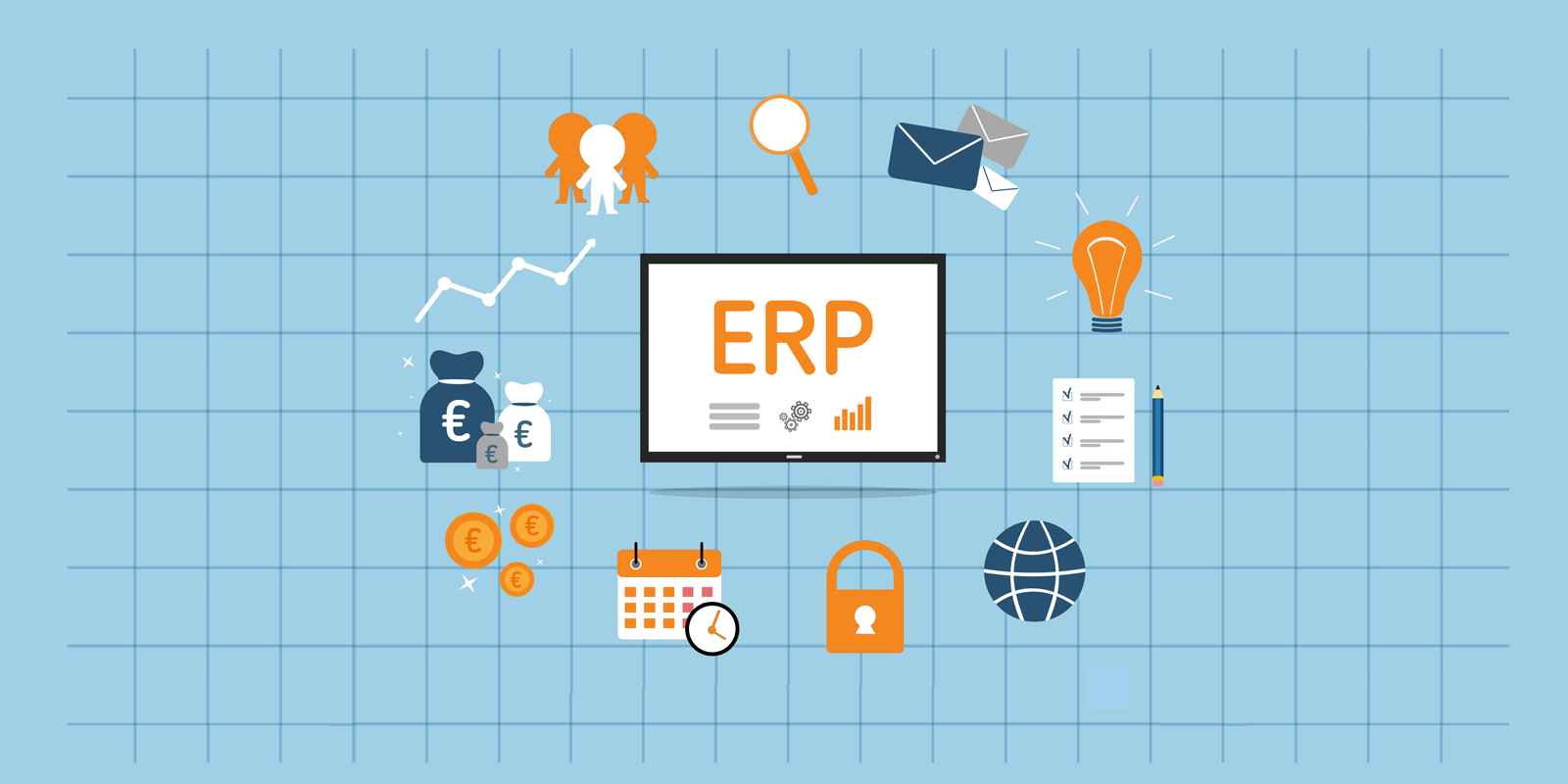Contact information.
-
Address"Ekzarh Yosif" street, 31, 1000 Sofia, Bulgaria
-
Phone:+359 2 980 95 99
-
Websitewww.balkanservices.com

If you search the internet for the keyword ERP, you will be swamped with information and let’s be honest – probably a little confused. Every website seems to have its own definition of an ERP system. However, these differences only highlight the many features that make ERP systems such a powerful tool.
In short, an ERP, or enterprise resource planning, system is a multifunctional business management software designed as an integrated set of software modules to bring together the core functional areas of an organization’s business.
Although the “E” in ERP stands for “enterprise,” today we are witnessing rapid and widespread adoption of business management systems among small and mid-sized companies in all industries.
Over the past few years, business software vendors have been investing more and more money and effort towards cloud technologies. Cloud-based systems not only make ERP platforms more affordable, without the need for a large initial investment in hardware, but also always up-to-date, as only the latest version of the software is used.
11 out of 19 industries in Bulgaria already have cloud-based ERP systems installed and running. These include leading industries such as manufacturing, trading, financial and insurance activities, transportation and warehousing, and the ICT industry.
At the most basic level, ERP software integrates the various functions within a company into a single, structured system, speeding up processes and supporting awareness throughout the organisation.
We’re talking about all the processes that are essential to running a business, including inventory and order management, sales, procurement, warehouse, accounting, human resources, customer relationship management (CRM), analytics and reporting, and more.
The key feature of all ERP systems is the shared database that supports multiple functions and information used by different business units. This means that information is entered only once and, without further processing, is reflected in all related modules (e.g. accounting, sales, etc.), becoming immediately available in real-time to all persons from different divisions authorized to receive it.
The enterprise resource planning system improves efficiency in business by:
Without an integrated system, some departments, such as finance and sales, typically use separate systems, causing the subsequent need for reconciliation and unnecessary waste of time.
ERP coordinates ordering, production, warehouse, accounting, and distribution. This greatly simplifies processes and minimizes errors due to data being entered in only one place and subsequently used by the entire enterprise without the danger of missing any important element.
ERP systems can standardize and automate production management and supporting processes. Based on the structured processes and the information accumulated over time, the system helps to plan the supply of materials and components and optimize the utilization of machines and human resources. This saves time and increases productivity.
In the absence of an integrated system, analyzing and tracking enterprise purchasing is challenging. Larger enterprises, for example, often find that different business units buy the same product without receiving volume discounts. Procurement tools in ERP assist teams by identifying vendors, products, and services already in use.
Based on preset key parameters, the system can predict upcoming sales, including their growth and seasonality. This information is combined with data on production specifications and stock levels, contracts with suppliers, and the delivery time of ordered goods and materials. The result is a delivery plan including specific dates and volumes. This ensures maximum utilization of the company’s financial and logistical resources, increased inventory turnover, and minimization of costs and input costs.
In addition to commercial and manufacturing activities, ERP systems also support companies working in the service sector – with project management, resources for their implementation, the allocation of tasks and subtasks over time, reporting, and performance control.
Since a modern ERP system collects and organizes information from all major business processes and units, report preparation is greatly facilitated by the use of the corresponding ERP modules within it. In addition to the classic tabular reports, ERP systems also offer summary KPIs, various graphical visualizations, and dynamic reminders to users about the tasks that lie ahead. Particularly handy are “drill-down” functionalities that allow one click to take any number in a report, table, or visualization to an even more detailed report or directly to the transaction that is the primary data source.
Most ERP systems include CRM tools to track all customer interactions. This provides insight into customer behavior and needs, facilitates and automates sales process management, creates continuity and traceability, enhances service quality, and provides a foundation for long-term customer relationships.
In today’s digital world, marketing automation is critical to the growth of any business. Information about customers, their behavior, preferences, and requirements also provides the basis for managing and automating marketing activities, organizing campaigns, analyzing customer follow-up, and as a result, optimizing and planning future activities.
To begin with, you need to get formal approval from senior management for the implementation and of course, for the redeployment of employees to carry out this project. To this end, prepare documents where you define the challenges that will be eliminated by the ERP software, describe its objectives and scope, implementation costs, plan and timeline, possible implementation risks, and projected benefits.
Look for the ERP system that best fits your business needs. This could be NetSuite, Soft1 ERP, or other software – research, ask around, and ask for references. Analyze your business processes and define them clearly. This will make implementation much easier and bring the benefits you are looking for.
It is a good idea to use an external ERP consultant throughout this process – this is usually an official partner of the developer of the ERP solution you plan to implement.
It is important to clarify that technologically advanced ERP systems offer scalability, which allows many small and medium-sized enterprises in Bulgaria to integrate some specific modules, and in the eventual expansion of the business, to proceed to invest in the full set of functionalities.
So, after management approval of the investment and the selection of a specific system, it is time to proceed with the implementation, in which you will take part together with the implementing company.
Select well the team of your employees who will assist in the implementation process. It should be made up of key users from the core business units in your company who will be directly involved in the process along with the consultants from the developer side responsible for the implementation.
Finalize contracts for the use of business software, technology, and implementation and support services.
Next, develop a work plan and timeline for the project, including the following milestones:
Once the implementation is complete, the project moves into the business software maintenance phase by the integrator. It is important to provide measures, including at the management level, to engage employees in using the new business management software, because this is a key factor in the success of the project.
Drawing on our years of experience as consultants, we can confidently say that choosing a reliable implementation partner is of the utmost importance to the success of your ERP project. As a consultant, he/she should understand your “pain”, identify the problems, assess what type of system can solve them, suggest suitable solution options, and have the necessary expertise to implement the project.
In the long run, choosing the right enterprise resource planning system ensures good management of your company’s business processes, which is the basis for adding value to your customers. The software should best fit your needs and provide options for future upgrades as your business grows.
Our team is here to listen carefully and offer the right solution for you.

According to ERP Today**, an independent business management technology solutions media, 2024’s sophisticated ERP systems market will be led by 4 major trends.
The cloud is increasingly attractive to enterprises across industries because of its efficiency, scalability, and cost-saving potential. The global cloud ERP market is expected to grow at 13.6% annually and reach $40.5 billion by 2025, according to Statista. Despite these large numbers, 60-70% of enterprises have not yet made the switch to a cloud ERP system and plan to make this transition in the next 2-10 years.
Gartner predicts that by 2026, 35% of product-centric enterprises will achieve a high degree of modularity in their ERP applications, integration, data, and security. This means there will be fewer strict long-term commitments to ERP vendors. Creating connected ERP applications/modules will become as simple as adopting code-free platforms.
Mobile ERP apps will become increasingly popular, and in 2024, more enterprises will look to multi-device experiences to enrich the end-user experience.
More and more digital transformation project managers are failing to keep up with time, budget, and workforce allocation. System integrators are realizing that old implementation methodologies no longer work.
In 2024, the ERP implementation industry will witness its own version of the “agile movement”(agile) that transformed the old slow world of waterfall software development in the early 1990s. This new movement will be supported by practices such as rapid continuous testing and test automation. It will also be tied to artificial intelligence – the meaningful application of artificial intelligence will lead to unprecedented levels of productivity for end users.
No business nowadays can grow and be competitive without the use of IT systems. Choosing the right software solution and implementing it is a complex, difficult but critically important decision.
At Balkan Services we have expert knowledge of business, technology and legislation, and we speak all three languages. We will listen carefully and advise you on choosing the right business system for your needs.
Balkan Services has been implementing business management software solutions since 2006 and has successfully completed over 140 ERP projects primarily in medium and large companies in the manufacturing, retail, service and banking sectors.